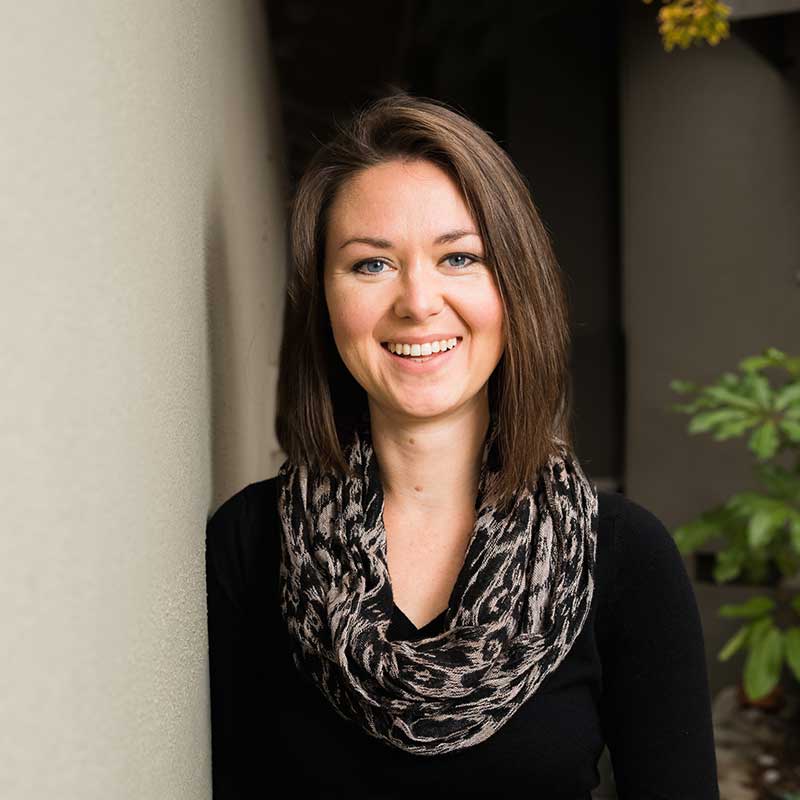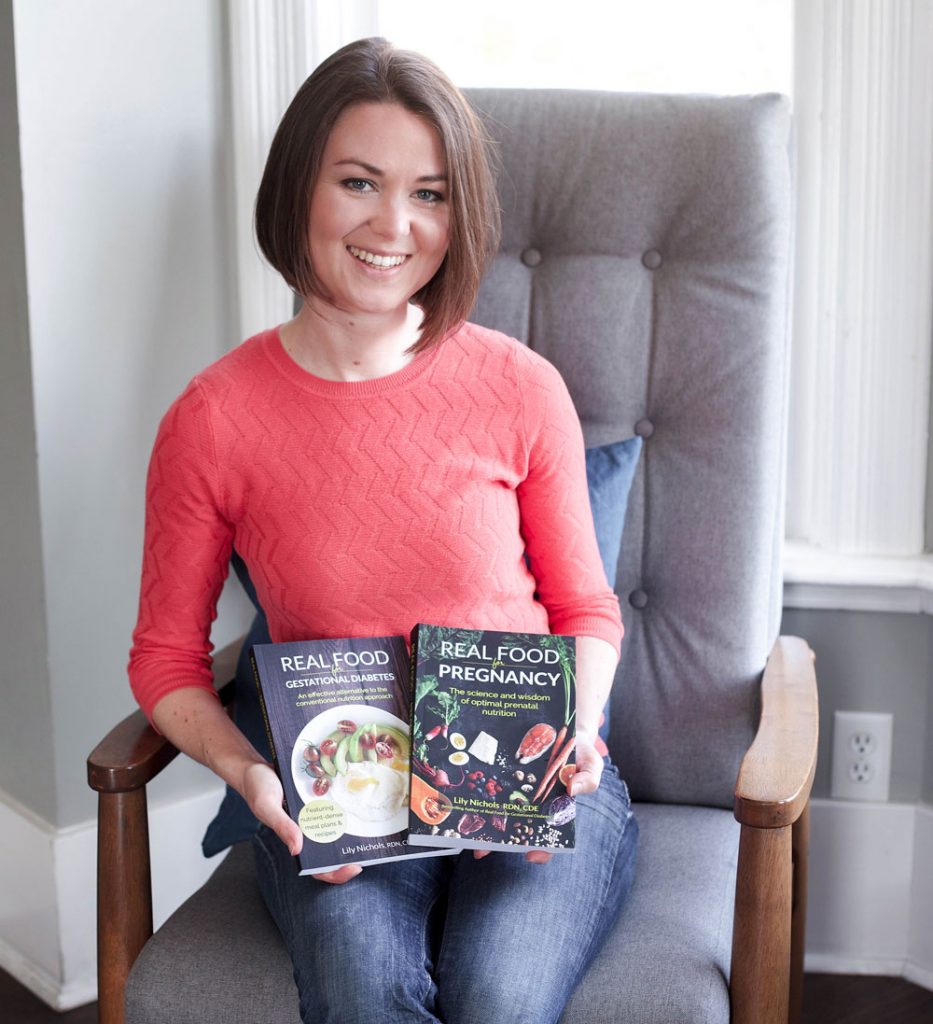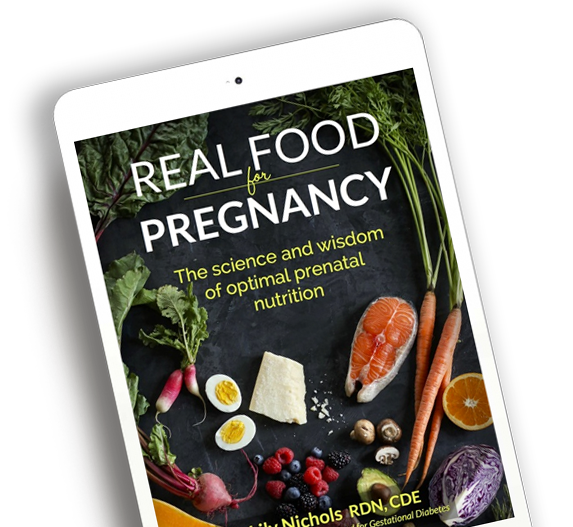ABOUT
The study of nutrition is complex and at the same time, inherently simple.
What to eat can be summed up in 2 words: real food.
How you define that term—and why you define it the way you do—is where you start getting into the weeds (more on this in a bit).
I’m guessing you know this. The people who are attracted to my work tend to be well-read in the nutrition/health/real food world. Perhaps you’re even a health professional yourself.
The reason people stick around is that I delve into the nuances, the unsolved mysteries, and most certainly, the controversial topics.

My career as a registered dietitian/nutritionist and certified diabetes educator unfolded rather organically and my work has included prenatal nutrition public policy, consulting, research, writing, and clinical practice. All of these experiences have brought me to where I am today. For you, this means you can trust that I have an in-depth understanding of all sides of the prenatal nutrition coin (including why conventional policy is what it is AND where there’s room for improvement).
In short, my work is known for being evidence-based (that is, backed by research) and sensible (yes, that’s a fancy way of saying common sense).
If you’ve read either of my bestselling books—Real Food for Pregnancy or Real Food for Gestational Diabetes—you know I’m a fan of research citations, yes (RFFP has over 930), but also making said scientific findings applicable to real life and understandable even by the non-scientist.
This is where the magic happens: where science and traditional wisdom intersect.
I’m passionate about sharing evidence-based prenatal nutrition information so mamas can have smoother pregnancies and health professionals can have the research to back up their real food recommendations.
I’m incredibly humbled to say that my books have:
- influenced international prenatal nutrition policy
- become required reading in university-level maternal nutrition classes
- been endorsed by many maternal health professionals
- inspired new research in prenatal nutrition
- helped tens of thousands of mamas have healthier pregnancies


Read the first chapter for FREE.
Mamas and mamas-to-be
I’m here to guide your uber proactive food & lifestyle choices, so your pregnancy experience is smooth sailing and your baby is fueled with the best nutrition right from the start.
Peruse my blog or grab a copy of Real Food for Pregnancy to get informed. Get started reading the first chapter right now—I give it away for free here.
If you have gestational diabetes (or suspect blood sugar issues), you’re in good hands. My free video series walks you through the basics for managing gestational diabetes without fear.
Healthcare Practitioners
Yes, I’m lookin’ at you, dietitians, midwives, doulas, doctors, nurses, and so on… Mamas turn to you for advice on prenatal nutrition and lifestyle. That means it’s up to you to stay abreast of the latest research (much of which suggests that current policies can do better).
In addition to my books, blog, and interviews, I offer an exclusive mentorship program, through the Institute for Prenatal Nutrition® as well as professional-level webinars via the Women’s Health Nutrition Academy. If you really want to dive deep into the research, these resources are for you.
Professional Bio
These kind of bios are always an awkward, toot-your-own-horn-in-third-person kind of thing, but there’s no avoiding it. Here’s mine.
Lily Nichols is a Registered Dietitian/Nutritionist, Certified Diabetes Educator, researcher, and author with a passion for evidence-based nutrition. Drawing from the current scientific literature and the wisdom of traditional cultures, her work is known for being research-focused, thorough, and sensible. Lily’s clinical expertise and extensive background in prenatal nutrition have made her a highly sought after consultant and speaker in the field.
Her work in the field of gestational diabetes, which presents a revolutionary nutrient-dense, lower carb approach, has not only helped tens of thousands of women manage their gestational diabetes (most without the need for blood sugar-lowering medication), but has also influenced nutrition policies internationally. You can learn more about her approach in her bestselling book, Real Food for Gestational Diabetes (and online course of the same name).
Lily is also the author of Real Food for Pregnancy, which provides an evidence-based look at the gap between conventional prenatal nutrition guidelines and what’s optimal for mother and baby. With over 930 citations, this is the most comprehensive text on prenatal nutrition to date. Since its publication, it remains the #1 bestselling book on prenatal nutrition.
Lily’s third book, Real Food for Fertility (co-authored with Lisa Hendrickson-Jack), is a comprehensive resource on optimizing preconception nutrition — for both partners — to improve outcomes in fertility, pregnancy, and beyond.
In addition to her books, Lily is founder of the Institute for Prenatal Nutrition®, where she mentors other practitioners on perinatal nutrition, and is the co-founder of Women’s Health Nutrition Academy, which offers individual webinars on a variety of women’s health topics.
You can learn from Lily’s extensive library of articles on LilyNicholsRDN.com and her research briefs on Instagram.
Short Bio
Lily Nichols is a Registered Dietitian/Nutritionist, Certified Diabetes Educator, researcher, and author with a passion for evidence-based nutrition. Her work is known for being research-focused, thorough, and sensible. She is the founder of the Institute for Prenatal Nutrition®, co-founder of the Women’s Health Nutrition Academy, and the author of three books: Real Food for Fertility (co-authored with Lisa Hendrickson-Jack), Real Food for Pregnancy, and Real Food for Gestational Diabetes. Lily’s bestselling books have helped tens of thousands of mamas (and babies!), are used in university-level maternal nutrition and midwifery courses, and have even influenced prenatal nutrition policy internationally. She writes at https://lilynicholsrdn.com. When she steps away from writing, you can find her spending time with her husband and two children — most likely outside or in the kitchen.
LILY'S BOOKS
10 fun facts + why I’m not your typical dietitian
- I have the skills to count calories and track macros, but I make the informed choice to opt for mindful eating instead.
- Whenever possible, I prioritize quality and sustainability in all aspects of my diet (i.e. grass-fed, pasture raised meat, dairy, and eggs, wild-caught seafood, and organically-grown/locally-sourced produce).
- I did not go through my conventional training with rose-colored glasses (i.e. did not—and still do not—view nutrition policy as gospel).
- I’m not afraid of fat, even butter or lard. In fact, animal fats are a staple in my diet (sourced from healthy animals—ala #2). I don’t trim the fat off meat, skim my bone broth, throw out the yolks, or toss delicious crispy chicken skin. This not only keeps my food delicious, but ensures I’m eating and absorbing essential nutrients.
- I’ve been a guest on over 200 podcasts/radio shows (you can see which ones on my press page).
- When I’m not reading research, writing, or speaking on prenatal nutrition, I’m probably wrangling my two kids, hiking, or foraging for wild food. If you follow me on Instagram, you’ll see what I mean.
- I taught Pilates for many years and although I’ve shifted my career back to nutrition, I still practice Pilates regularly. My former nickname (and name of my first blog) was Pilates Nutritionist.
- I’m averse to following recipes, but I will force myself to do it if I’m developing recipes for my blog, course, or books. It’s for the greater good, right?! My e-cookbook features 30 recipes perfect for preconception, pregnancy, and postpartum recovery.
- Reading research studies is one of my favorite past times; I read 10-20 most weeks. #nutritionnerd
- Putting research into context is my jam. Questions always on the top of my mind are: Why did the authors study this in the way they did? How was it studied? Who funded it? Are the results applicable to real life? If so, how? Do the findings make sense in the context of ancestral nutrition? And are the conclusions supported by the data in the study? I’ll just stop right there before I bore you to tears…
What can you expect from this site?
- Evidence-based prenatal nutrition
- Fertility nutrition
- Exercise in pregnancy
- Foods to avoid + foods to emphasize in pregnancy
- Postpartum recovery & nutrient repletion
- Gestational diabetes diet
- Controversies in gestational diabetes diagnostic tests, management, and much more
- Supplements in pregnancy & breastfeeding
- Breastfeeding nutrition
- Real food recipes
- … and so much more



